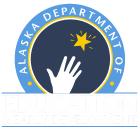- Cama-i, quyana tailuci!
- (Central Yup’ik)
- "Greetings, thank you for coming!"
International Researchers Look to Alaska’s “Transforming Schools Framework” for case study of trauma-informed education

Adversity experienced during childhood has long lasting impacts, but research on how both individuals and institutions such as schools can best respond in light of childhood trauma is still emerging. Now researchers seeking to understand best practices for improving education outcomes for students who have experienced trauma are looking to Alaska.
It’s been 25 years since a CDC-Kaiser Permanente study correlated Adverse Childhood Experiences (ACEs) to health and behavior issues in adults. Additional research over the last two decades has continued to deepen the understanding of adversity, trauma, and resilience.
Recently a working paper authored by researchers at the American Institutes for Research and published by the international Organization for Economic Cooperation and Development provides an in-depth synthesis of existing research on improving education outcomes for students who have experienced adversity and/or trauma. In their paper, the authors examined Alaska’s Transforming Schools Framework as one of five case studies that explored the role of the education sector in promoting well-being, learning, and positive educational outcomes for children who have experience adversity and/or trauma.
“Given their substantial role in children’s lives, educational institutions and systems are in a unique
position to help buffer children from the negative effects of adversity and/or trauma. At the same time,
if educators and educational systems are unaware of the complexities of adversity and trauma, are
unprepared to respond with support, and/or provide a negative school environment, they can exacerbate or even cause student difficulties,” study authors wrote. “For example, a review across 10 OECD countries found that support for children’s holistic needs was often viewed by educators as extraneous to a school’s primary mission of academic instruction.”
The paper examined common causes and effects of adversity in children, factors that mitigate or exacerbate the effects of adversity and/or trauma, and education policies and practices at the system, school, and student level. In addition to Alaska’s Transforming Schools Framework, the researchers also conducted case studies examining programs in Ontario, Australia, Ohio, and New York City.
DEED began developing Transforming Schools: A Framework for Trauma-Engaged Practice in Alaska in partnership with the Alaska Association of School Boards and the Alaska Mental Health Board in 2017. The framework was developed with other partners including the First Alaskans Institute, Alaska Child Trauma Center, Alaska Department of Public Safety, Alaska Afterschool Network and hundreds of other Alaskans through various conferences and meetings. Funding for the framework came from a grant from the Statewide Suicide Prevention Council.
“Since childhood adversity is so common, schools are already deeply engaged with the trauma their students, families, staff and even communities have experienced. They are acutely engaged with the many strengths and resilience of their communities too. The framework recognizes this and offers a path for how to address both the trauma experienced and tap into the resilience of people in the school community. Schools no longer need to create their own response to trauma from scratch or buy a program designed for somewhere else. They can use an Alaskan made framework, not locked behind copyrights, that provides a basis for positive change,” said Sharon Fishel with DEED’s Division of Innovation and Education Excellence . “The framework was designed with significant input from hundreds of Alaskans and draws on science and old wisdom from across the state. It is rooted in the strengths of Alaskan people and their growing acknowledgement of our struggles too.”
The framework consists of 11 modules ranging from deconstructing trauma and policy considerations to school-wide climate and cultural integration.
“Connecting families and the community to develop strong partnerships is an essential component in improving schools. What many schools find when they look at the framework is that they are already doing much of the necessary work. The framework just helps them add a few new pieces to the mix and sharpen what they are already doing,” said Pat Sidmore, with DHSS’s Division of Public Health. “Finally, there must be a recognition that support for the health of the adults working with Alaska students is key to being effective. Since relationships are the essential component in teaching academics and the social skills necessary for success, the health of adults matter, too. Self-care and support for educators must be central to the work of schools. Well supported adults in the school and successfully engage with all students including those who are struggling and make a positive change. The impacts will last a lifetime.”
Since the framework was finalized the Department of Education and Early Development has mailed out more than 9,000 copies. A Transforming Schools Trauma Engaged toolkit to accompany the framework is available online and eLearning courses are available for educators.
The OECD working paper notes that while the framework is designed to respond to needs in Alaska yet can also be a valuable resource outside the state.
“Some of the steps and practices recommended in the study are specific to the Alaskan context, recognizing the unique history of Alaskan Native people,” paper authors wrote. “If properly adapted, these steps can be implemented in other contexts, and considerations are provided throughout the framework in the form of reflective questions, assessment questions and adaptable suggested steps for each module.”
People can obtain copies of “Transforming Schools: A Framework for Trauma Engaged Practice in Alaska” by emailing Sharon.fishel@alaska.gov.
